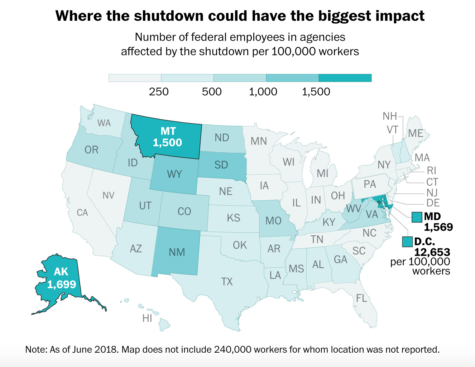The Impacts of the Partial Government Shutdown on Federal Employees
March 18, 2019
On January 25, 2019, the longest government shutdown in United States history came to an end after lasting for thirty-five days, breaking the previous record, the 21 day-long 1995-1996 government shutdown under Bill Clinton’s administration. Beginning on December 21, 2018, approximately 800,000 federal employees were either furloughed or required to show up to work and denied payment throughout the shutdown. A government shutdown is a period of time in which there is a funding gap that results in a complete or partial closing of various federally-run organizations. This government shutdown began due to a standoff between President Donald Trump and Congress. President Trump demanded that Congress allocate 5.7 billion dollars to pay for the construction of a wall on the United States-Mexico border in an attempt to fulfill his primary campaign promise. Democrats argue that Trump closed the government in a “temper tantrum” by refusing to sign bipartisan funding legislation last year that did not allot money for his wall. With neither side yielding, the shutdown continued for over a month, leaving hundreds of thousands of federal employees in a state of unpaid uncertainty.
As the partial shutdown progressed, its effects became more noticeable in American life. For example, some companies in Silicon Valley were not able to issue IPOs, Native American land reservations were denied federal funds, thousands of immigration hearings were been delayed or canceled, airport lines grew longer as TSA agents who could no longer afford to work without pay stopped showing up, and national parks across the country, such as Joshua Tree, were irreparably vandalized. The wide-ranging impacts of this government shutdown are a frightening reminder of how many important roles the federal government plays in the daily lives of Americans, and what an enormous vacuum it can create when it stops functioning.
On Friday, January 25, 2019, after thirty-five days of senseless inaction, President Donald Trump capitulated to growing pressure to reopen the government. He consented to a short-term funding deal that allowed federal employees to return to paid work; however, he did not receive the billions of dollars in border wall funding that he had demanded throughout the previous month. Since December, Democrats in Congress have maintained that the President must agree to reopen the federal government before they discuss border wall funding. After weeks of futile resistance, President Trump agreed. His long overdue concession set a dangerous precedent, as the month-long impasse left hundreds of thousands of Americans financially insecure, angry, and fearful of another shutdown.

“If we don’t get a fair deal from Congress, the government will either shut down on February 15th again, or I will use the powers afforded to me under the laws and the Constitution of the United States to address this emergency…We will have great security,” Trump said. The President’s remarks left many wondering if he was more concerned about the financial security of everyday Americans or the security of his re-election.
I interviewed Liz Turkmany, a TSA agent, about how the government shutdown impacted her and her family.
How long have you been a TSA agent, where do you work, and what do you enjoy most about your job?
I have been with TSA at LAX which is governed by the Department of Homeland Security for over seven years and am currently assigned to the United Airlines checkpoint. My absolute favorite part of my job is when I get to meet celebrities. I have been lucky enough to meet Meryl Streep, Forest Whitaker, Miles Teller, Will Ferrell, Demi Lovato, Katy Perry, Lady Gaga and so many more people in the entertainment business, most of whom are really nice.
How did the government shutdown impact you and your family?
Fortunately, the shutdown didn’t have a huge impact on my family. The job provides outstanding benefits for us, and there was no loss of those benefits during the shutdown. I didn’t enjoy working without pay. It took an emotional toll on us as a family and definitely affected the morale of TSA officers as a group. Let’s just say it made us a bit cranky.
Given the extremely important nature of your job, how did you feel about TSA agents being delayed pay for 35 days?
Most of the agencies that were affected by the shutdown are anti-terrorist agencies, which include TSA, FBI, Secret Service, CBP, and the Coast Guard. All of us had to report to duty as emergency-essential employees and were denied our paycheck during that 35-day period. During a shutdown, members of the federal government such as Congress, still receive their pay, so there is little motivation to have a meeting of the minds. Unfortunately, some of the younger officers I work with struggled without a paycheck. They didn’t have money for rent, food, books for school, or other bills. A few officers had to sleep in their cars in the employee parking lot, because they could not afford the gas to get to and from work. During the shutdown, we missed two paychecks and still have not been paid in full even though the government has been reopened since January 25. This hardly seems fair.
Do you think that this shutdown was necessary? Why or why not?
No, I do not think a government shutdown is ever necessary. The government should always find a way to bridge the gap and not let the people suffer. I believe it is their responsibility to govern under any circumstances.
Now that the government shutdown is over (at least until February 15th), how is it still impacting you (if at all)?
I guess you could say that I am bracing myself for the next go-around, and if there is another shutdown, it could last longer. As I said, my benefits are guaranteed through a shutdown so I will try to stick it out for as long as possible. Unfortunately, many other officers will not be able to do the same.
How did the shutdown affect employee morale? What do you think will be some of its long-term impacts?
When the shutdown began, we were all hopeful that it would not last long. This was not my first government shutdown, but it was the longest one. As time dragged on, and there seemed to be no end in sight, morale began to decline. Having the support of the passengers, airlines, shops, and eateries within the airport, as well as the local outside community, was extremely gratifying. They brought in food almost daily which allowed us to see the very best of humanity. Having their support went a long way. As for the long-term impact, only time will tell. Many officers are looking for other jobs because they do not believe they can go through another shutdown. As a result, we will lose excellent officers who truly believe in the mission of securing our airports and making air travel safe.



